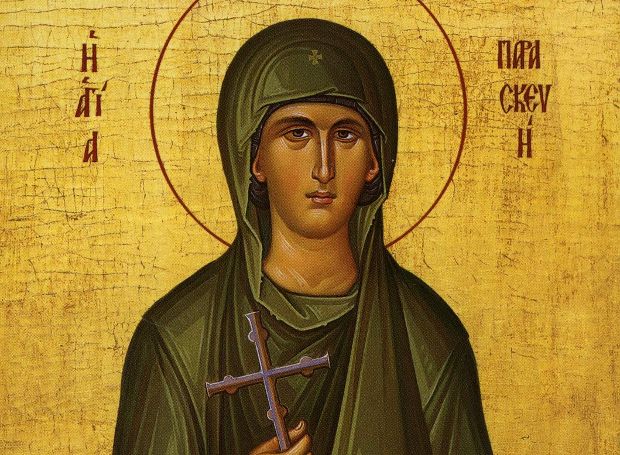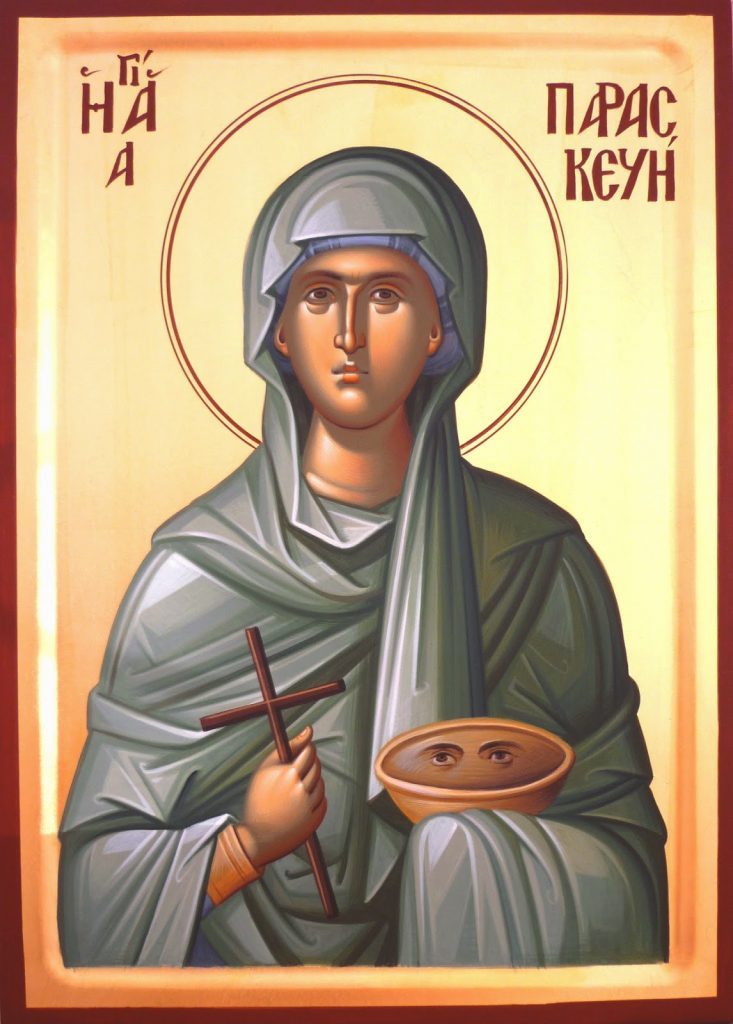Paraskevi the Righteous Martyr of Rome (26 July)

Holy Virgin Martyr Paraskevḗ of Rome was the only daughter of Christian parents, Agathon and Politia, and from her early years she dedicated herself to God. She spent much of her time in prayer and the study of the Holy Scriptures. After the death of her parents Saint Paraskevḗ distributed all of her inheritance to the poor, and consecrated her virginity to Christ. Emulating the holy Apostles, she began to preach to the pagans about Christ, converting many to Christianity.
She was arrested during the reign of Antoninus Pius (138-161) because she refused to worship the idols. She was brought to trial and fearlessly confessed herself a Christian. Neither enticements of honors and material possessions, nor threats of torture and death shook the firmness of the saint nor turned her from Christ. She was given over to beastly tortures. They put a red-hot helmet on her head and threw her in a cauldron filled with boiling oil and pitch. By the power of God the holy martyr remained unharmed. When the emperor peered into the cauldron, Saint Paraskevḗ threw a drop of the hot liquid in his face, and he was burned. The emperor began to ask her for help, and the holy martyr healed him. After this the emperor set her free.
Traveling from one place to another to preach the Gospel, Saint Paraskevḗ arrived in a city where the governor was named Asclepius. Here again they tried the saint and sentenced her to death. They took her to an immense serpent living in a cave, so that it would devour her. But Saint Paraskevḗ made the Sign of the Cross over the snake and it died. Asclepius and the citizens witnessed this miracle and believed in Christ. She was set free, and continued her preaching. In a city where the governor was a certain Tarasius, Saint Paraskevḗ endured fierce tortures and was beheaded in the year 140.
Many miracles took place at the saint’s tomb: the blind received sight, the lame walked, and barren women gave birth to children. It is not only in the past that the saint performed her miracles, but even today she helps those who call on her in faith.
Parasceva was born in Rome of Christian parents, and from her youth was instructed in the Faith of Christ. With great fervor, St. Parasceva endeavored to fulfill all the commandments of God in her life. Believing firmly and living according to her faith, Parasceva directed others on the path of salvation and in the pious life. When her parents died, Parasceva distributed all of her property to the poor, and was tonsured a nun.

As a nun, she preached the Christian Faith with an even greater zeal, not hiding from anyone, even though at that time the Roman authorities were conducting a bloody persecution against the Christian Faith. Then, the pernicious Jews denounced St. Parasceva for preaching forbidden faith, and she was brought to trial before Emperor Antoninus. All the flatteries of the emperor did not shake the faith of this handmaiden of God.
They then subjected her to torture by fire, and placed a red-hot helmet on her head. The Lord miraculously saved her, and Parasceva was freed, and left Rome. She continued traveling from city to city to convert pagans to the True Faith. She was brought before princes and judges in two more cities, and was tortured for her Lord, at which time she worked great miracles and, by the power of God, quickly recovered from her pains and wounds.
The pagans, as always, ascribed her miracles to magic and her swift recoveries to the mercy of their gods. St. Parasceva once said to the prince who was torturing her: “O prince, it is not your gods who have healed me, but my Christ, the True God.” Finally, a certain Prince Tarasius beheaded her with the sword. Thus, this saint gloriously ended her fruitful life. Her relics were later translated to Constantinople. She suffered honorably for Christ in the second century.
Saint Paraskeve, who was from a certain village near Rome, was born to pious parents, Agatho and Politia. Since she was born on a Friday (in Greek, Paraskeve), she was given this name, which means “preparation” or “preparedness” (compare Matt. 27:62, Mark 15:42, Luke 23:54, and John 19:31, where ‘Friday’ is called “the day of the preparation”).
From childhood she was instructed in the sacred letters and devoted herself to the study of the divine Scriptures, while leading a monastic life and guiding many to the Faith of Christ. During the reign of the Emperor Antoninus Pius, she was apprehended because she was a Christian and was urged to worship the idols, but she answered with the words of Jeremias: “Let the gods that have not made heaven and the earth perish from off the earth” (Jer. 10:11). Because of this she endured exceedingly painful torments, and was beheaded in the year 140. The faithful pray to her for the healing of eye ailments.
Apolytikion of Martyr Paraskeve
First Tone
Appropriate to your calling, O Champion Paraskevi, you worshipped with the readiness your name bears. For an abode you obtained faith, which is your namesake. Wherefore, you pour forth healing and intercede for our souls.
Source: oca.org / goarch.org / westserbdio.org





